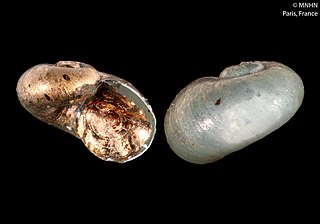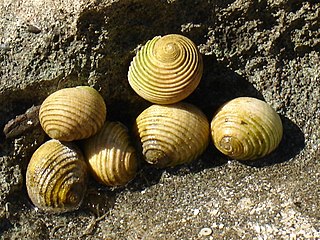Eogastropoda was a previously used taxonomic category of snails or gastropods, a subclass which was erected by Ponder and Lindberg in 1997. It was one of two great divisions (subclasses) of the class Gastropoda, the snails. The other subclass of gastropods was the Orthogastropoda.
Eogastropoda were the more primitive of the two subclasses, representing a much older line of gastropods. This subclass contained all of the true limpets.
Orders within the Eogastropoda consisted of:
The Library of Congress Classification (LCC) is a system of library classification developed by the Library of Congress in the United States. It is used by most research and academic libraries in the U.S. and several other countries.
In class-based programming, the factory method pattern is a creational pattern that uses factory methods to deal with the problem of creating objects without having to specify the exact class of the object that will be created. This is done by creating objects by calling a factory method—either specified in an interface and implemented by child classes, or implemented in a base class and optionally overridden by derived classes—rather than by calling a constructor.
In object-oriented programming, the template method is one of the behavioral design patterns identified by Gamma et al. in the book Design Patterns. The template method is a method in a superclass, usually an abstract superclass, and defines the skeleton of an operation in terms of a number of high-level steps. These steps are themselves implemented by additional helper methods in the same class as the template method.

The gastropods, commonly known as snails and slugs, belong to a large taxonomic class of invertebrates within the phylum Mollusca called Gastropoda.

Opisthobranchs is now an informal name for a large and diverse group of specialized complex gastropods which used to be united in the subclass Opisthobranchia. That taxon is no longer considered to represent a monophyletic grouping.

Archaeogastropoda was a taxonomic order of sea snails used in older classifications of gastropods, i.e. snails and slugs. Archeogastropoda are marine prosobranch gastropod mollusks, mainly herbivores, typically having two gills and a double-chambered heart, with the eggs and sperm discharged directly into the water. They were traditionally regarded as a relatively primitive group.

Prosobranchia was a large taxonomic subclass of sea snails, land snails and freshwater snails. This taxon of gastropods dates back to the 1920s. It has however been proven to be polyphyletic. Generally speaking in biology taxonomy is required to reflect phylogeny, in other words the classification of a group must reflect its evolutionary descent, as far as that is known, so the taxon Prosobranchia is no longer considered suitable to be used.
Orthogastropoda was a major taxonomic grouping of snails and slugs, an extremely large subclass within the huge class Gastropoda according to the older taxonomy of the Gastropoda.
The Bellerophontida is a taxonomic order of extinct marine mollusks that are found in the fossil record from the Lower Cambrian to the Lower Triassic. They are considered by some experts to be primitive sea snails with primarily symmetrically coiled shells, marine gastropod mollusks.
In object-oriented programming, inheritance is the mechanism of basing an object or class upon another object or class, retaining similar implementation. Also defined as deriving new classes from existing ones such as super class or base class and then forming them into a hierarchy of classes. In most class-based object-oriented languages, an object created through inheritance, a "child object", acquires all the properties and behaviors of the "parent object", with the exception of: constructors, destructor, overloaded operators and friend functions of the base class. Inheritance allows programmers to create classes that are built upon existing classes, to specify a new implementation while maintaining the same behaviors, to reuse code and to independently extend original software via public classes and interfaces. The relationships of objects or classes through inheritance give rise to a directed graph.

Cypraeoidea, the cowries and cowry allies, is a superfamily of sea snails, marine gastropods included in the clade Littorinimorpha. This superfamily had been called Cypraeacea and was named by Rafinesque in 1815.

Neomphalidae is a family of sea snails or limpets, specifically deep sea hydrothermal vent limpets. This family was included in the Vetigastropoda, which is a clade according to the Bouchet & Rocroi, 2005. It is now included in the clade Neomphalina.
David R. Lindberg is an American malacologist and professor of integrative biology at the University of California, Berkeley. He is also the Curator for the University of California Museum of Paleontology and co-editor of the journal Molecular Systematics and Phylogeography of Mollusks.

In immunology, antibodies are classified into several types called isotypes or classes. The variable (V) regions near the tip of the antibody can differ from molecule to molecule in countless ways, allowing it to specifically target an antigen . In contrast, the constant (C) regions only occur in a few variants, which define the antibody's class. Antibodies of different classes activate distinct effector mechanisms in response to an antigen . They appear at different stages of an immune response, differ in structural features, and in their location around the body.

IgG deficiency is a form of dysgammaglobulinemia where the proportional levels of the IgG isotype are reduced relative to other immunoglobulin isotypes. IgG deficiency is often found in children as transient hypogammaglobulinemia of infancy (THI), which may occur with or without additional decreases in IgA or IgM.
Winston F. Ponder is a noted malacologist from New Zealand who has named and described many marine and freshwater animals, especially micromolluscs. He graduated with an MSc, PhD and DSc from the University of Auckland, New Zealand.

Neritimorpha is a taxonomic grouping, an unranked clade of snails, gastropod mollusks. This grouping includes land snails, sea snails, some deepwater limpets, and also freshwater snails. This clade used to be known as the superorder Neritopsina.

Cycloneritida is a order of land snails, freshwater snails, and sea snails.

Tonna canaliculata is a species of large sea snail, a marine gastropod mollusk in the family Tonnidae, the tun shells.

Ophioglossidae is one of the four subclasses of Polypodiopsida (ferns). This subclass consists of the ferns commonly known as whisk ferns, grape ferns, adder's-tongues and moonworts. It is equivalent to the class Psilotopsida in previous treatments, including Smith et al. (2006). The subclass contains two orders, Psilotales and Ophioglossales, whose relationship was only confirmed by molecular phylogenetic studies.